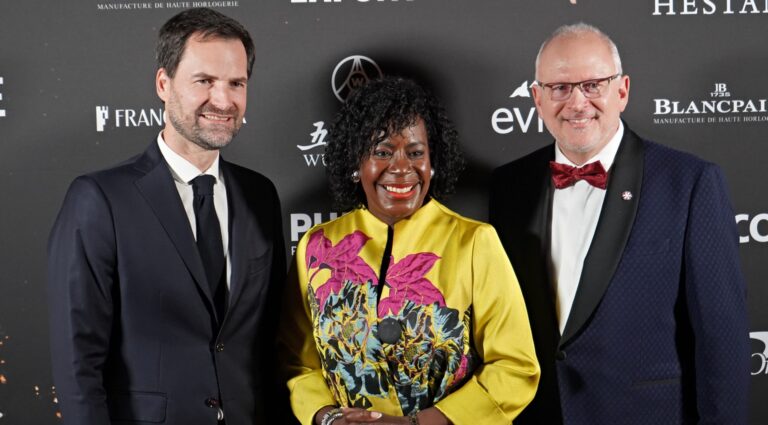What Philly’s new Michelin stars mean for the city’s food scene
Local food critic Jon Deutsch dives into Philadelphia’s fine dining scene with WHYY’s “Morning Edition” host Jennifer Lynn.
Listen 6:02
Gwendal Poullennec, international director of the Michelin Guide (from left), Mayor Cherelle Parker and president and CEO of the Philadelphia Convention and Visitors Bureau Gregg Caren. (Nick Kariuki/Billy Penn)
From Philly and the Pa. suburbs to South Jersey and Delaware, what would you like WHYY News to cover? Let us know!
Three Philadelphia restaurants have officially joined the ranks of Michelin-starred dining, each earning a coveted one-star award: Her Place Supper Club, Friday Saturday Sunday and Provenance. The announcement marks a major moment for the city’s culinary scene, and raises the stakes for chefs and diners alike. To unpack the significance, WHYY’s Morning Edition host Jennifer Lynn spoke with Jon Deutsch, a classically trained chef, Drexel University professor and food critic for “The Infatuation.”
—
Jennifer Lynn: What do these distinctions say about Philly as a food lover’s city?
Jon Deutsch: It says that we are a world-class food lover’s city, which I think anyone who’s dined in Philly already knew. But some people wanted outside validation of that, and now we have it.
JL: And I know you’re very happy for the restaurants. I know some of your students have co-oped at all three-starred restaurants. That’s got to be a thrill to have that connection.
JD: It is a thrill, and as much credit as these innovative and much-acclaimed chefs deserve, it’s really a team effort. I know them all well enough to know that they would all say that. We’re really thrilled to have students, alumni, co-ops, front of house, back of house, who’ve at some point gone through all three of those restaurants. We’re so proud.
JL: Let’s talk about how a Michelin star is earned. I know there are inspectors. They’re very highly trained. What are they looking for when they visit a prospective starred restaurant?
JD: So, there are five criteria according to the Michelin site: quality of ingredients, mastery of flavor and cooking techniques, the personality of the chef reflected in the cuisine, the harmony of flavors, and consistency across all visits.
JL: And to bring Michelin into play in a city, there is some pay-to-play. What is going on that you’re aware of?
JD: I think it’s really important for listeners to understand that Michelin is a paid system. It’s a for-profit company with the same origins as the tire company. And it was originally intended as a way to boost tourism and exploring, really, the French countryside and recommending restaurants that were worthy of a road trip where you would wear down your tires. And the reason Philly has not had Michelin stars in the past has nothing to do with the quality of restaurants or chefs or anything else; it was because we hadn’t paid for it. And this year, the Convention and Visitors Bureau put up the funds to have Philly Michelin-rated, but it was not a reflection on us that we weren’t rated previously.
JL: This is an investment in our city, that pay-to-play part of it, but also perhaps that money could have been used for so many other things to support the scene.
JD: There’s a good rationale to invest in Michelin. Obviously, as a convention and visitors bureau, the CVB probably feels that that will help book more conventions and meetings. That’s understandable. I’m sure Visit Philly feels that this will help boost tourism if people hear about Michelin-starred restaurants that they need to try. I’m not sure that that will bring anyone out more than a James Beard restaurant, but that’s up for some debate.
I did talk to a restaurateur who said, “Well, don’t forget, it’s much easier to get talented chefs and managers and sommeliers from other cities who want to have a Michelin-recommended or Michelin-starred restaurant on their résumé.” So those are all some good reasons. It strikes me as a very unfulfilling thing to do, to pay someone from outside Philly to come in and tell us that we’re a good restaurant city. I think anyone who eats in Philly knows we’re a great restaurant city.
We don’t know the exact number, it’s not public. But by all accounts from other cities, hundreds of thousands of dollars. At least 100k per star to learn that, “Hey, you have some pretty good restaurants here.” I could have told them that for half that amount of money if anyone asked me.
JL: And do you think big investments should be made to strengthen our culinary and hospitality industry? Investing in what things?
JD: Things like scholarships for culinary students, workforce-development trainings to get us through all this exciting stuff happening in 2026. Things like lowering hurdles for underrepresented or emerging restaurateurs. Those kinds of things, I think, need to go hand-in-hand with congratulating ourselves on having great restaurants, right? We need to invest in the future and be even better.
JL: And how do these stars change the game for restaurants?
JD: One of the reasons Philly is such a great restaurant city, these and so many restaurants got recognition because of the creativity and the innovation and the fun. And because consistency is one of the criteria, I worry a little bit, and we’ve seen this in other cities, that people hold on to their star and are so desperate to keep it that they may stop innovating, they may stop creating and evolving, and want things to be exactly as they were for that inspector.
So, I think that’s a risk, but I think smart restaurateurs are already thinking about next year. If they didn’t get a star, I know for a fact they’re thinking about, “What can we do differently?” And if they did get a star, it’s, “How can we get two next year?”
JL: And what about the eating public? How do we get into these Michelin-star restaurants going forward?
JD: What I would say is, don’t forget about the many, many wonderful restaurants that were not mentioned on Tuesday, and they need our support as well. So I’ve made it my personal pledge to give Michelin a break after the hype dies down a little. I’ll go see some of the Michelin friends.
JL: Very good. Jon Deutsch, classically trained chef and professor of culinary arts and science at Drexel University. Thanks for joining us.
Three Philadelphia restaurants have officially joined the ranks of Michelin-starred dining, each earning a coveted one-star award: Her Place Supper Club, Friday Saturday Sunday and Provenance. The announcement marks a major moment for the city’s culinary scene, and raises the stakes for chefs and diners alike. To unpack the significance, WHYY’s Morning Edition host Jennifer Lynn spoke with Jon Deutsch, a classically trained chef, Drexel University professor and food critic for “The Infatuation.”
—
Jennifer Lynn: What do these distinctions say about Philly as a food lover’s city?
Jon Deutsch: It says that we are a world-class food lover’s city, which I think anyone who’s dined in Philly already knew. But some people wanted outside validation of that, and now we have it.
JL: And I know you’re very happy for the restaurants. I know some of your students have co-oped at all three-starred restaurants. That’s got to be a thrill to have that connection.
JD: It is a thrill, and as much credit as these innovative and much-acclaimed chefs deserve, it’s really a team effort. I know them all well enough to know that they would all say that. We’re really thrilled to have students, alumni, co-ops, front of house, back of house, who’ve at some point gone through all three of those restaurants. We’re so proud.
JL: Let’s talk about how a Michelin star is earned. I know there are inspectors. They’re very highly trained. What are they looking for when they visit a prospective starred restaurant?
JD: So, there are five criteria according to the Michelin site: quality of ingredients, mastery of flavor and cooking techniques, the personality of the chef reflected in the cuisine, the harmony of flavors, and consistency across all visits.
JL: And to bring Michelin into play in a city, there is some pay-to-play. What is going on that you’re aware of?
JD: I think it’s really important for listeners to understand that Michelin is a paid system. It’s a for-profit company with the same origins as the tire company. And it was originally intended as a way to boost tourism and exploring, really, the French countryside and recommending restaurants that were worthy of a road trip where you would wear down your tires. And the reason Philly has not had Michelin stars in the past has nothing to do with the quality of restaurants or chefs or anything else; it was because we hadn’t paid for it. And this year, the Convention and Visitors Bureau put up the funds to have Philly Michelin-rated, but it was not a reflection on us that we weren’t rated previously.
JL: This is an investment in our city, that pay-to-play part of it, but also perhaps that money could have been used for so many other things to support the scene.
JD: There’s a good rationale to invest in Michelin. Obviously, as a convention and visitors bureau, the CVB probably feels that that will help book more conventions and meetings. That’s understandable. I’m sure Visit Philly feels that this will help boost tourism if people hear about Michelin-starred restaurants that they need to try. I’m not sure that that will bring anyone out more than a James Beard restaurant, but that’s up for some debate.
I did talk to a restaurateur who said, “Well, don’t forget, it’s much easier to get talented chefs and managers and sommeliers from other cities who want to have a Michelin-recommended or Michelin-starred restaurant on their résumé.” So those are all some good reasons. It strikes me as a very unfulfilling thing to do, to pay someone from outside Philly to come in and tell us that we’re a good restaurant city. I think anyone who eats in Philly knows we’re a great restaurant city.
We don’t know the exact number, it’s not public. But by all accounts from other cities, hundreds of thousands of dollars. At least 100k per star to learn that, “Hey, you have some pretty good restaurants here.” I could have told them that for half that amount of money if anyone asked me.
JL: And do you think big investments should be made to strengthen our culinary and hospitality industry? Investing in what things?
JD: Things like scholarships for culinary students, workforce-development trainings to get us through all this exciting stuff happening in 2026. Things like lowering hurdles for underrepresented or emerging restaurateurs. Those kinds of things, I think, need to go hand-in-hand with congratulating ourselves on having great restaurants, right? We need to invest in the future and be even better.
JL: And how do these stars change the game for restaurants?
JD: One of the reasons Philly is such a great restaurant city, these and so many restaurants got recognition because of the creativity and the innovation and the fun. And because consistency is one of the criteria, I worry a little bit, and we’ve seen this in other cities, that people hold on to their star and are so desperate to keep it that they may stop innovating, they may stop creating and evolving, and want things to be exactly as they were for that inspector.
So, I think that’s a risk, but I think smart restaurateurs are already thinking about next year. If they didn’t get a star, I know for a fact they’re thinking about, “What can we do differently?” And if they did get a star, it’s, “How can we get two next year?”
JL: And what about the eating public? How do we get into these Michelin-star restaurants going forward?
JD: What I would say is, don’t forget about the many, many wonderful restaurants that were not mentioned on Tuesday, and they need our support as well. So I’ve made it my personal pledge to give Michelin a break after the hype dies down a little. I’ll go see some of the Michelin friends.
JL: Very good. Jon Deutsch, classically trained chef and professor of culinary arts and science at Drexel University. Thanks for joining us.
JD: Yeah, thanks for having me. Yeah, thanks for having me.

Get daily updates from WHYY News!
WHYY is your source for fact-based, in-depth journalism and information. As a nonprofit organization, we rely on financial support from readers like you. Please give today.






